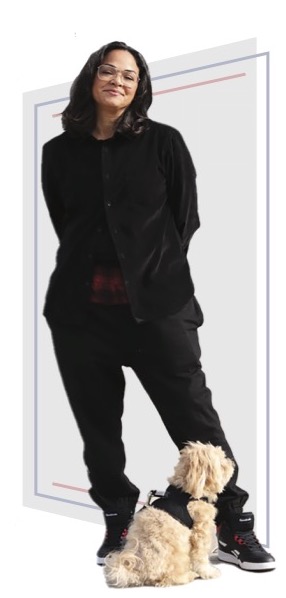This interview took place on the homelands belonging to the Council of the Three Fires, the Ojibwe, Potawatomi and Odawa.

KO with their dog, Eddie, who accompanies them to campus every day. (Photo by Eloise Apple)
At Radio City Music Hall in New York City, theatre professor KO basked in the bright lights. They had just accepted the Best Actress in a Musical Tony Award for their portrayal of Anita in West Side Story. Surrounded by people who looked like them and lived similar experiences, KO encountered something out of their wildest dreams.
Because their father was a director and their mother enjoyed stage managing, KO grew up on the stage. They fondly remember believing theatre was something everyone did, like going to the grocery store. During their 20 years in the industry, they have played Faith in Brooklyn, Angelica Schuyler in Hamilton and originated In the Heights’ Vanessa on Broadway. In 2022, KO became an associate professor of theatre and the director of the Music Theatre Certificate program at Northwestern.
KO sat down with NBN to talk about building a career and professional life.
The following interview has been edited and condensed for length and clarity.
Q: What would you tell a young person trying to find a job they are passionate about in a competitive field?
A: If you’re passionate about the field, understand what you bring to it. You obviously know that you like it, but there’s something very specific about the way you see it. That is unique to you. That should be the cornerstone of how you step into most of your spaces.
Q: How do you find that quality that makes you priceless or unique?
A: Spend a little bit more time being quiet. Meditation is huge. Really start to look at what you’re surrounding yourself with. Knowing what you believe in and having integrity in your work will lead you to a place in which you can execute the thing that only you have.
Q: How do you manage the expectations others have for you?
A: My job is not me. That’s hard for a lot of us to think about, right? We think that we go to school so that we can make a salary, and then that thing starts to define us, but the way I make money is just a skill that I have. When I go to work, I go to work, and then I stop. I’m another incredibly complex human being, so I don’t take the work part of it as seriously. I’m not trying to carry it home with me.
Q: How do you challenge systemic obstacles in the professional space?
A: They say that this generation has a sense of entitlement. What I recognize is this generation realizes that despite what they’ve been given, they actually deserve more. If you know that you want the world to look a certain way, then when you go into that new job, you have the ability to implement those things. You have the power because you have the privilege of coming from this institution. You look at the tiny things that can shift the culture or shift the atmosphere, and you target those that are reforming. Then the next generation behind you will have less to combat, and then revolution happens.